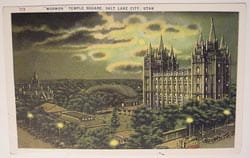By Neylan McBaine
 The Church of Jesus Christ of Latter-day Saints is a Do-It-Yourself Church: No paid clergy, no trained professionals, no hired leadership. Whatever happens on Sundays in our church worship is the result of members' volunteer dedication to leading, teaching, and organizing. Members of congregations are asked by local leaders to hold "callings," or church jobs.
The Church of Jesus Christ of Latter-day Saints is a Do-It-Yourself Church: No paid clergy, no trained professionals, no hired leadership. Whatever happens on Sundays in our church worship is the result of members' volunteer dedication to leading, teaching, and organizing. Members of congregations are asked by local leaders to hold "callings," or church jobs.
Naturally, every member of the Church has his or her own favorite calling. For some, the favorite might be watching over the nursery class; for others, it might be the family history specialist. There is one job, though, that seems to come up time and time again on members' "favorite calling" list: Gospel Doctrine teacher. The scriptural teacher for the adult Sunday School class is certainly at the top of my list too, and, lucky me, it happens to be my current calling. Again.
I have been called as Gospel Doctrine teacher in every ward I've lived in as an adult, including the ward I just moved into a few months ago. But this most recent experience is different from the other four times I've taught this class: For the first time, I am teaching a predominantly senior congregation, members who have sat in those same seats, in that same ward, for twenty, thirty, and even forty years. As a 33-year-old woman, I stand before 70- and 80-year-old men, and each week I try to prove I can teach them something new about the scriptures they've studied their whole lives.
The primary reason that Gospel Doctrine teacher is on everyone's favorite list is that the calling forces the teacher to spend time not just reading the scriptures, but really delving into them through focused study. I agree that this is the greatest benefit of the calling. Even though we should ideally be studying the scriptures on our own time even without the pressure of teaching the material at the end of the week, the truth is that scripture study usually means reading a few verses before we fall asleep. But sadly, Gospel Doctrine classes typically don't provide the same stimulation for class members as they do for the teachers. Somewhere between the teacher's study and the presentation of the material, the spirit of searching scripture study gets lost and the class inevitably goes to sleep while the teacher drones on.
Why are not more Gospel Doctrine classes thought-provoking, stimulating, and informative? A recent three-part series on the LDS blog, By Common Consent, provides an insightful and sometimes humorous examination on why we sleep more than study in these classes, and provides some helpful solutions. I agree with much of what the author discusses in this series, but I'd like to offer my own straightforward, deceptively simple suggestion for how we could improve our scripture study class: We, teachers and students both, need to treat our scriptures as books, as literature, and less like a collection of wise sayings or doctrinal nuggets.
I was an English major in college. I'm a writer. Call me biased, but I think it's pretty obvious that our scriptures -- the Old Testament, the New Testament, as well as the LDS-specific works of The Book of Mormon, the Doctrine & Covenants, and Pearl of Great Price -- have all the elements of great literature. They have locations and characters. Stuff happens to those characters. There are climaxes and denouements. There are good guys and bad guys. There are motivations, conflicts, and real-life emotions. There are themes and patterns that thread not just through the individual books but through the whole collection of scripture.
Our Gospel Doctrine curriculum is structured to approach these books more as math problems than literature: Each week, our carefully constructed manual puts us on a scavenger hunt through the works; we add up the messages of individual verses, trying to come up with the right answer for what these phrases might equal in our modern lives. What we come away with as members of these classes is mastery of individual verses without any idea of their context, who said them, why they were said, or what they mean in the larger picture of the literature's story arch. Another common teaching default is to use a single verse as a jumping off point for what I call "lifestyle discussions" so that instead of delving into the works themselves we tell stories from our own lives that tangentially relate to a wise saying from the lesson material.
As a teenager growing up in New York City, I had the rare opportunity of attending an early-morning Seminary class with a teacher who herself had studied at Hebrew University in Jerusalem. She spoke Hebrew fluently, but more impacting for her teenage students was the fact that she loved the scriptures as books. An avid reader of any sort of literature, she understood that the scriptural books work together to give us as readers an epic tale of families, migrations, disappointments, and triumphs. And this isn't just any epic work of literature; it is our epic. It is our story, our people, and we can love the characters or hate them, admire them or revile them just as we would in any work of literature.




